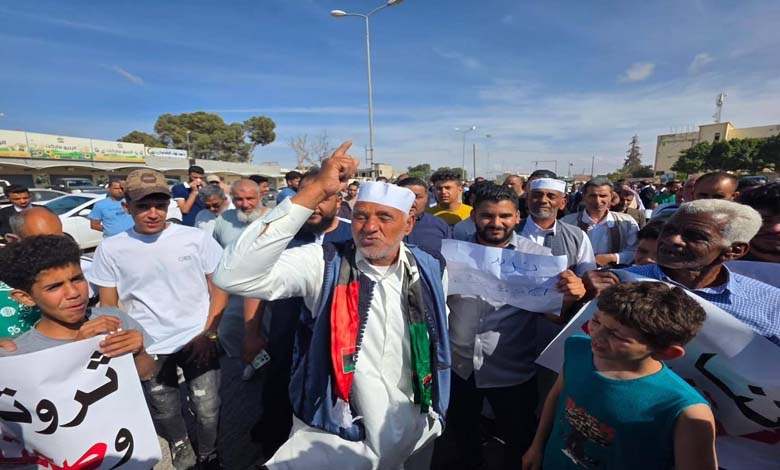Libyans Persist in Street Protests to Oust Dbeibeh — A Message to Tetteh

Mohamed al-Menfi expresses support for peaceful protests in Tripoli demanding the dismissal of Prime Minister Abdul Hamid Dbeibeh and the dissolution of his government, increasing pressure on the UN-backed unity government.
-
Dbeibeh denies seeking to make changes in the composition of the Oil Corporation’s Management
-
Washington Denies Training Armed Groups in Tripoli under Agreement with Dbeibeh
A new demonstration took place in Libya’s capital, Tripoli, calling for the removal of the internationally recognized Government of National Unity, led by Abdul Hamid Dbeibeh. The protest comes amid mounting political and security tensions. Presidential Council head Mohamed al-Menfi backed the peaceful rallies, describing them as “civilized” — a position that adds to the growing pressure on Dbeibah‘s government. The protests also serve as a clear signal to UN envoy Hanna Tetteh, who opposes an abrupt end to the current administration without consensus, arguing it would deepen divisions.
Hundreds of protesters gathered across Tripoli, especially in Martyrs’ Square. “Libyans from all segments of society are demanding the government’s ouster and elections within six months,” said Fadjra al-Raqibi, a protester participating in Friday’s demonstration. “The people want a solution. They are fed up,” she added.
-
“Intransigent” position – Abdul Hamid Dbeibeh still refuses to hand over power
-
Salvation Friday: Libyans Hold Their Breath Amid Fears of Militia Chaos
Protesters chanted slogans calling for “Dbeibeh to leave before Eid al-Adha,” which falls on June 6 this year. The protest was conducted peacefully under heavy security supervision.
Since the fall of Muammar Gaddafi’s regime in 2011, Libya has been embroiled in conflict and deep divisions. Two rival governments are currently operating: one in Tripoli (west), led by Dbeibeh and recognized by the UN, and another in Benghazi (east), led by Osama Hamad and supported by the House of Representatives and Field Marshal Khalifa Haftar.
Presidential and parliamentary elections scheduled for December 2021 were indefinitely postponed due to persistent disputes between rival factions.
-
Gheniwa’s Blood Strangles Dbeibah… Tripoli’s Nero Burns in His Own Fire
-
Militia Arms Chaos Reignites Violence Spiral in Tripoli
Some protesters demanded the dissolution of all institutions established under UN auspices in early 2021 — including the Government of National Unity, the High Council of State (acting as a senate), and the parliament elected in 2014 and based in the east.
In a post on X, Mohamed al-Menfi praised “the civilized national scene demonstrated by citizens in the capital as they peacefully and responsibly expressed their aspirations.”
He added: “We highly appreciate the role of security forces in protecting this right. Our hope has always been in the people’s voice as a tool for positive change.” He called on citizens to “continue peaceful and civilized expression across all cities, to help build a modern state that meets the hopes and aspirations of all Libyans.”
-
Political Stalemate Brings Militias in Western Libya Back into the Spotlight
-
Corruption and Terrorism Financing Drive Washington to Suspend Aid to Libya
Between May 12 and 15, Tripoli witnessed heavy clashes between armed groups and pro-government forces after the Government of National Unity announced plans to dismantle all militias controlling the city, which Dbeibah described as “more powerful than the state.”
According to the UN, at least eight people were killed before a ceasefire was reached last Thursday.
In response to the government’s handling of the crisis, thousands protested last week in central Tripoli. A police officer guarding the government headquarters was killed during an attempted attack by a “group mixed among the protesters,” according to an official statement.
-
Calls in Libya to Prevent Tunisian Arrest Warrant against Muslim Brotherhood Businessman
-
Clashes Between Militias in Tripoli Mar Eid Atmosphere
In a televised interview on Thursday, Hanna Tetteh emphasized the need to ensure the “right to protest” for “all citizens dissatisfied with the current administration.”
She added that “the international community still recognizes the Government of National Unity, but we acknowledge that it is under protest from citizens, especially in western Libya.”
Although Tripoli has enjoyed relative calm since Field Marshal Khalifa Haftar’s large-scale offensive in 2019, which ended with a permanent ceasefire in June 2020, the capital continues to experience sporadic clashes between rival militias competing for control over key areas and strategic sites.












